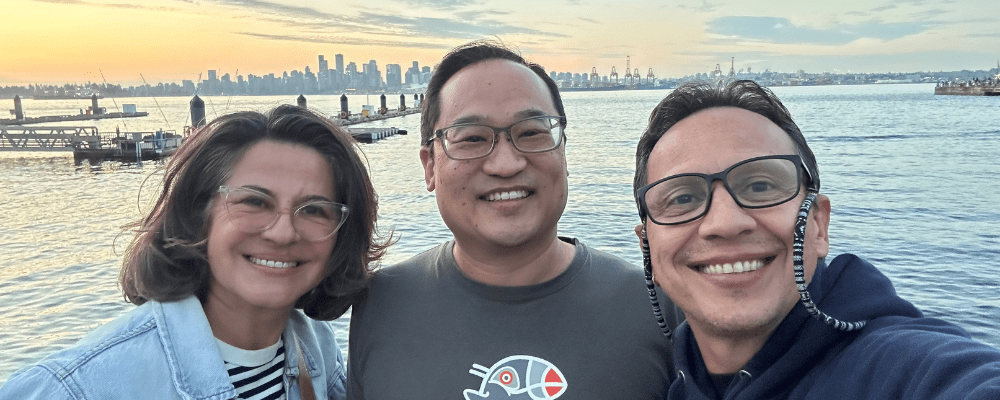By: Amir Khan, Communications Assistant
Photo Courtesy: Hamidullah Abawi (far right), speaking at the Third International Conference on Safe Schools in Palma de Mallorca, Spain; Moderated by Lord Baron Tariq Ahmad, Minister of State Foreign Commonwealth & Development Affairs of the United Kingdom.
“It was October 2021; I was stuck in Kabul.”
Hamidullah Abawi, now Manager of the Metro Vancouver Refugee Readiness Team, remembers fearing for his life and his family in the Afghan capital as the world witnessed the hasty withdrawal of Western forces followed by the subsequent Taliban takeover in August 2021.
In his previous role as a senior advisor to the former Minister of Education in Afghanistan, Abawi’s impactful work rendered him a target for armed groups within the country. This precarious situation necessitated his departure from Afghanistan and compelled him to seek a new place to call home.
“Upon realizing the imminent collapse, I swiftly took action to ensure the safety of my staff. I facilitated the evacuation of my team from the office, implemented security measures to secure the premises, and subsequently returned to my residence — we remained at home as the collapse unfolded,” Abawi recalls.
“Given my family’s background and personal involvement in government affairs, joined with my subsequent employment with an international non-governmental organization, I found myself struggling with increased concerns and fears. The knowledge of our association with both the government and an international NGO instilled a sense of fear for the safety and well-being of both myself and my wife, making the situation undeniably frightening.”
During the ensuing rush to leave Afghanistan via humanitarian corridors established by NATO and U.S. forces, Abawi says his family abroad tried to have him evacuated to the Kabul airport, but these attempts failed.
“In the end, it didn’t work. We tried to escape twice, and we were shot at [both times] and I decided I was not going to use this route because it was too dangerous for us.”
While biding their time to secure an exit, Abawi and his family were forced to stay with extended family and friends and continuously changed locations to evade the risk to their lives.
“My house was searched three times, they broke every single thing in my house, including furniture and artifacts. They destroyed anything they saw, and they were looking for us.”
As a graduate in International Studies at the American University of Dubai, Abawi says his university friends in the United Arab Emirates were able to help him and his wife secure visas for the U.A.E. and a flight out of Kabul — an endeavour which otherwise would’ve taken months.
“We had to pack our entire life into a 20-kilogram suitcase,” Abawi says. “We worked all our lives to make our home and everything, and we just had to leave it. All our hopes and aspirations were shattered. I witnessed the devastation and despair that has befallen Afghanistan. I feel like a lot has gone wrong, betrayed by the circumstances beyond our control, and abandoned by the very allies that once promised to stand by us. The hope we had was replaced by sense of despair, and the dreams we nurtured slipped away like sand through our fingers.”
Abawi proceeded to assume his responsibilities remotely from Dubai as the Country Director of Street Child UK, a London-based humanitarian organization. Street Child UK focuses on delivering crucial services such as education, child protection, food assistance, psycho-social support and mental health aid to a significant number of vulnerable Afghans. Under Abawi’s management, a workforce of over 1,600 individuals were supported.
While operating from the secure environment of Dubai, Abawi recognized the necessity to reunite with his family, who had already established themselves in Canada and the U.S. He characterized his Afghan passport as a restrictive “prison sentence,” offering minimal freedom of mobility. Moreover, he was aware that his Emirati visa, while not permanent, could potentially expire at any moment without the option of renewal. Such a circumstance could result in his and his wife’s repatriation to Afghanistan. Consequently, he initiated preparations to relocate to Vancouver.
“Once I came to Canada, it was like a new home for me, and we love it here,” Abawi says. “In terms of safety, stability and services, everything is amazing for us.”
According to Immigration Refugees and Citizenship Canada (IRCC) statistics, as of May 2023, nearly 32,000 Afghans have been welcomed to Canada under all streams since August 2021.
Among initial fears of not knowing how to rebuild his life in a new country, a thought that crosses many newcomers’ minds, Abawi says he was happy to finally reunite with his mother whom he hadn’t seen in three years. He describes the memory as an emotional moment for him and his family.
“When [my mother] saw me at the airport, she burst into tears. It felt so good to at least reunite with family. It was a really good feeling to see my mother and just see the fact that my wife feels safe now; she knows she’s in a country where we won’t be harmed.”
Abawi says his experience as a refugee inspires him to continue his work in helping newcomers, which led him to volunteer for various non-profits, including Global Rights Defenders and SurreyCares Community Foundation, before joining MOSAIC.
On World Refugee Day (June 20) and every day, MOSAIC is committed to working with thousands of refugees and refugee claimants escaping armed conflict and persecution through various initiatives including Operation Not Forgotten and the Afghan Response initiative, among others. According to the United Nations, 20 people around the world have their lives uprooted each minute as they try to escape war or persecution.




